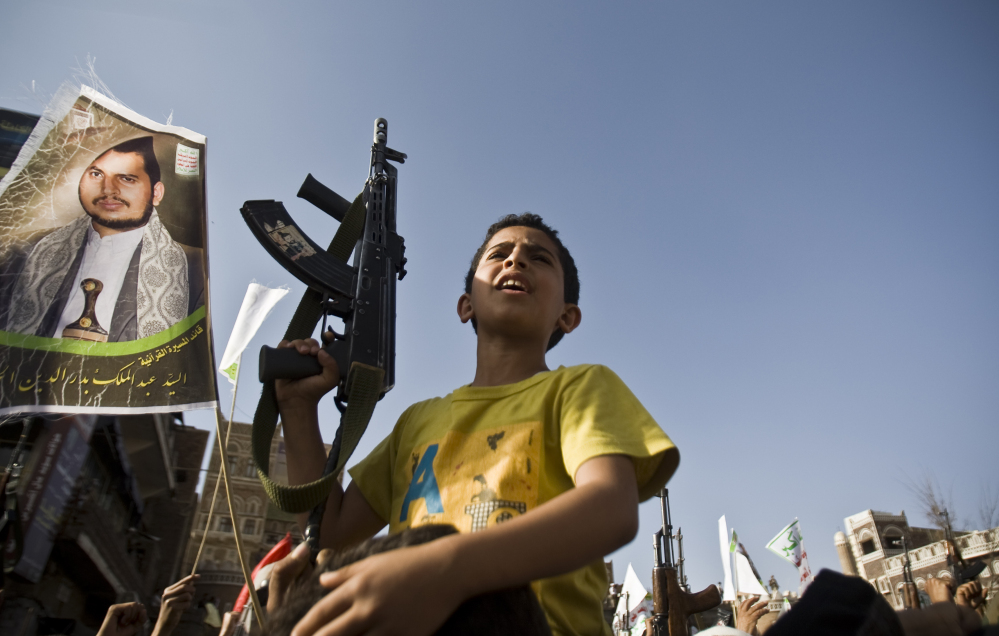BEIRUT — The meltdown in Yemen is pushing the Middle East dangerously closer toward the wider regional conflagration many long have feared would arise from the chaos unleashed by the Arab Spring revolts.
What began as a peaceful struggle to unseat a Tunisian dictator four years ago and then mutated into civil strife now risks spiraling into a full-blown war between regional rivals Saudi Arabia and Iran over a country that lies at the choke point of one of the world’s major oil supply routes.
With negotiators chasing a a deal to curb Iran’s nuclear program, it seems unlikely that Iran would immediately respond militarily to this week’s Saudi airstrikes in Yemen, analysts say.
But the confrontation has added a new layer of unpredictability – and confusion – to the many, multidimensional conflicts that have turned large swathes of the Middle East into war zones over the past four years, analysts say.
The United States is aligned alongside Iranian-backed militias in Iraq and against them in Yemen. Egypt and the United Arab Emirates, who have joined in the Saudi offensive in Yemen, are bombing factions in Libya backed by Turkey and Qatar, who also support the Saudi offensive in Yemen. The Syrian conflict has been fueled by competition among all regional powers to outmaneuver one another on battlefields far from home.
Not since the 1960s – and perhaps going back further – has there been a time when so many Arab states and factions were engaged in so many wars, in quite such confusing configurations, said Frederic Wehrey of the Carnegie Endowment for International Peace.
‘IT’S SO DANGEROUS’
“It’s so dangerous,” he said.
The trigger for this latest flare-up was the march toward the headquarters of Yemen’s president in the southern port city of Aden by the Shiite Houthi militia, which overran the capital, Sanaa, several months ago.
By late last week, when the Saudi-led coalition’s strikes were launched, President Abed Rabbo Mansour Hadi had fled to Riyadh, and the Houthi militia seemed poised to seize control of most of the rest of the country.
For Saudi Arabia, which regards itself as the guardian of Sunni interests in the region, the advance of the Shiite Houthis represented far more than a threat to a Sunni ally, analysts say. It was the culmination of years of humiliating Iranian expansion throughout the Middle East that has seen Sunni influence shrink at the expense of Iran and its allies, and Saudi interests seemingly abandoned by the United States, said Mustafa Alani of the Dubai-based Gulf Research Council.
The Iranian-backed Hezbollah movement holds sway in Lebanon; Iranian-backed fighters have been instrumental in propping up President Bashar al-Assad in Syria; and in Iraq, Iranian-backed militias now wield power over more territory than the Iraqi army.
‘IT’S LIKE A DOMINO’
With its intervention in Yemen, Saudi Arabia is serving notice that it will no longer tolerate Iran’s unchecked expansion – nor will it count on the United States to protect its interests, Alani said.
“It started with Lebanon, then Syria, then Iraq and now Yemen. It’s like a domino, and Yemen is the first attempt to stop the domino,” he said. “Now there is an awakening in the region, a counter-strategy, and Yemen is the testing ground. It is not just about Yemen, it is about changing the balance of power in the region.””It is not only the Iranian nuclear bomb that is an issue, it is Iranian behavior that is equal to a nuclear bomb,” he said.
John Jenkins, a former British ambassador to Iraq and Saudi Arabia, who is now the Bahrain-based executive director of the Institute for International and Strategic Studies in the Middle East said the negotiations in Lausanne, Switzerland, “are one of the guarantees that things won’t blow up.”
A failed offensive in Yemen would also risk further empowering extremists said Wehrey of the Carnegie Endowment.
“It’s hard for me to see how the Saudis will bring this to a decisive end that will restore their people in Saana and diminish ISIS and al-Qaida,” he said. “In Libya, airstrikes polarized the exisiting civil war and opened the way for ISIS, and I’m afraid of the same thing happening in Yemen.”
Send questions/comments to the editors.



Success. Please wait for the page to reload. If the page does not reload within 5 seconds, please refresh the page.
Enter your email and password to access comments.
Hi, to comment on stories you must . This profile is in addition to your subscription and website login.
Already have a commenting profile? .
Invalid username/password.
Please check your email to confirm and complete your registration.
Only subscribers are eligible to post comments. Please subscribe or login first for digital access. Here’s why.
Use the form below to reset your password. When you've submitted your account email, we will send an email with a reset code.